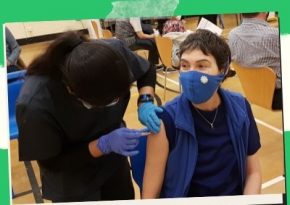
WHO anticipates that by 2023, Covid won’t be considered a global health emergency.
The World Health Organization (WHO) expressed optimism on Wednesday that Covid-19 will eventually cease to be a global health emergency.
The last year had been yet another difficult one for the health of the people throughout the world, according to WHO Director-General Tedros Adhanom Ghebreyesus at a news conference in Geneva.
Tedros stated that when omicron was first discovered, it had just begun to take off.
Covid-19 killed 50,000 people per week at the time, while less than 10,000 people died last week.
Although we have come a long way, Tedros added, “That’s still 10,000 too many, and there is still a lot that all countries can do to preserve lives.” We anticipate being able to state that Covid-19 is no longer a global health emergency at some point in 2019.
The WHO elevated Covid-19 to the highest level of alert under international law at the end of January 2020, designating it as a public health emergency of international concern.
Less than 100 cases and no fatalities were recorded outside of China at the time.
Spread the data,
In order to better understand the causes of this virus, Tedros said, “We continue to urge on China to provide the data and carry out the investigations that we have requested.” “All theories are still on the table, as I have indicated many times.”
More vaccination is required, according to WHO officials, to battle Covid-19, but in China, where cases have increased, only approximately 60% of the population has received the vaccine.
The disease, first identified in China at the end of 2019, has been the subject of more than 645 million confirmed cases, about 6.64 million fatalities, and more than 13 billion vaccinations, according to the WHO.
When the Emergency Committee meets in January, one of the things up for discussion will be the requirements for declaring the emergency to be over.
This pathogen will undoubtedly persist, he said.
The WHO director continued, “It’s here to stay, and all countries will need to learn to manage it alongside other respiratory infections, like influenza and RSV, both of which are already circulating intensely in many countries.
In low-income nations, he said that only one in five people had received vaccinations.
According to Tedros, “access to Covid-19 diagnostics and life-saving medicines remains unacceptable costly, and unfair.”
Save/Share this story with QR CODE
Disclaimer
This article is for informational purposes only and does not constitute endorsement of any specific technologies or methodologies and financial advice or endorsement of any specific products or services.
📩 Need to get in touch?
Feel free to Email Us for comments, suggestions, reviews, or anything else.
We appreciate your reading. 😊Simple Ways To Say Thanks & Support Us:
1.) ❤️GIVE A TIP. Send a small donation thru Paypal😊❤️
Your DONATION will be used to fund and maintain NEXTGENDAY.com
Subscribers in the Philippines can make donations to mobile number 0917 906 3081, thru GCash.
3.) 🛒 BUY or SIGN UP to our AFFILIATE PARTNERS.
4.) 👍 Give this news article a THUMBS UP, and Leave a Comment (at Least Five Words).
AFFILIATE PARTNERS

World Class Nutritional Supplements - Buy Highest Quality Products, Purest Most Healthy Ingredients, Direct to your Door! Up to 90% OFF.
Join LiveGood Today - A company created to satisfy the world's most demanding leaders and entrepreneurs, with the best compensation plan today.



 Business Technology, Finance Technology & Information Technology
Business Technology, Finance Technology & Information Technology





